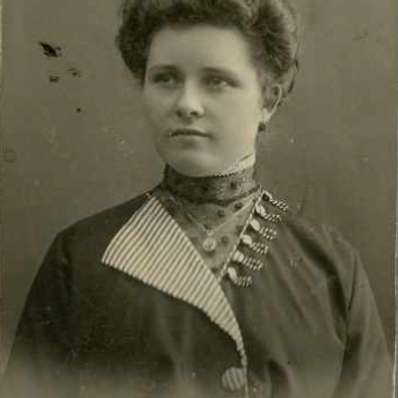Maria Klein Hilbert
Between faith and love.

Maria Klein met her husband, Paul Hilbert, during a visit to an art gallery in Leipzig, Germany in 1912. While Maria was raised Catholic, Paul’s family was highly involved in the Lutheran church. Because of the initial contention this created within their families and congregations, they chose not to talk about religion after they wed—each adhering to their own faith.
When Paul was drafted into World War I, Maria found herself reading the Bible, searching for light. Her study only left her with more questions, and she found herself walking up and down her flat, wringing her hands asking, “Heavenly Father, where is truth? Please help me find it?”
One day, a neighbour asked if she would like to hear what some men had to say about religion. She decided to go and listen. She had met “Mormons” before and had not been impressed with them. The “Mormon” woman who lived nearby appeared slovenly and unkempt and was often rude to Maria, who was very tidy and prided herself upon cleanliness and organisation.
After meeting with the missionaries, she went home and thought, “What wonderful news I had just heard.” Yet, she was dismayed to learn that instead of the beautiful churches in which the Lutherans and Catholics worshiped, the early members of The Church of Jesus Christ of Latter-day Saints were meeting in a corner beerhall. Her initial response was, “Me go into a place like that? Never in my life will I set my foot in a beerhall.”
When Sunday morning arrived, Maria was restless and felt as if someone was pushing her out the door. Before she knew it, she was standing in front of the beerhall. She hesitated, then entered and a feeling of overwhelming joy came over her. She felt she had come home.
When she wrote to tell Paul of her baptism, he responded, “When I come home to visit, I will investigate Mormonism and if it is the word of God, I will be baptised also.” Two years later in October of 1917, he came home on leave and was baptised.
After the Nazi Party came to power in Germany, Paul’s refusal to join the party led to his dismissal from his job. He was unable to find work for the next five years and the family struggled against starvation and economic hardships. Shortly before the outbreak of the Second World War, Paul found a job in Berlin, moving the family to Opelnerstrasse. During the war, both Maria’s sons and her husband were conscripted, leaving her alone in Berlin with four teenage daughters.
While much of Berlin was being destroyed by Allied air raids, Maria felt guided to where her family would be safe as the bombs fell. When the Soviet Army approached the city, rumours of their atrocities preceded them and Maria took the initiative to take her daughters into hiding. On the night they left their flat, Maria said a fervent prayer that her daughters would share light and love and not work for vengeance. As the city was ravaged by occupying troops, Maria was able to keep her daughters safe—one time standing down a Russian soldier and refusing to let him pass the door.
Soon after Victory Day in Europe, when much of Berlin was starving, Maria heard of a Nazi storehouse that had been opened to the public. She and her daughters brought home large sacks of food. They predicted, with careful rationing, it would last them at least six months. However, they chose to share the food with those in need instead—unsure of when they would get more.
When their daily ration was down to only two potatoes, Maria, weak with hunger, prayed, “I can do no more, I know thou canst send help if it be thy will.” That same day, a major in the American army who she had never met before arrived at her door with a large box of food. He explained in broken German that he had once seen their family at church and remembered their name. Earlier that morning he had felt this urge to go to the military food reserves and bring a box to their family.
He told Maria, “This war has been so terrible that I could not believe God still loved us. I had lost my faith. I was pushed to bring this to you so that I could know again the feeling of serving him.”
Maria’s daughters would remember her mother’s legacy of ingenuity in protecting them physically, but also in giving them an example of love and faith that sheltered them from the fear and hatred that so readily present amidst war.
Contributions
Research: Sarah Smart
Writing: Sarah Smart
Editing: Amy Epps & Louise Paulsen
Photography: Courtesy of Sharon Cutler
Sources:
Hilbert Reece, Karola. “Berlin Miracle’”, Ensign, 1978. https://www.churchofjesuschrist.org/study/ensign/1978/10/berlin-miracle?lang=eng
—. “The Memories of Karola Hilbert Reece of her Mother: Maria Klein Hilbert’”.
Ursula Eva Hilbert Wendel, “Guilty by Birth, Innocent by Choice”.



